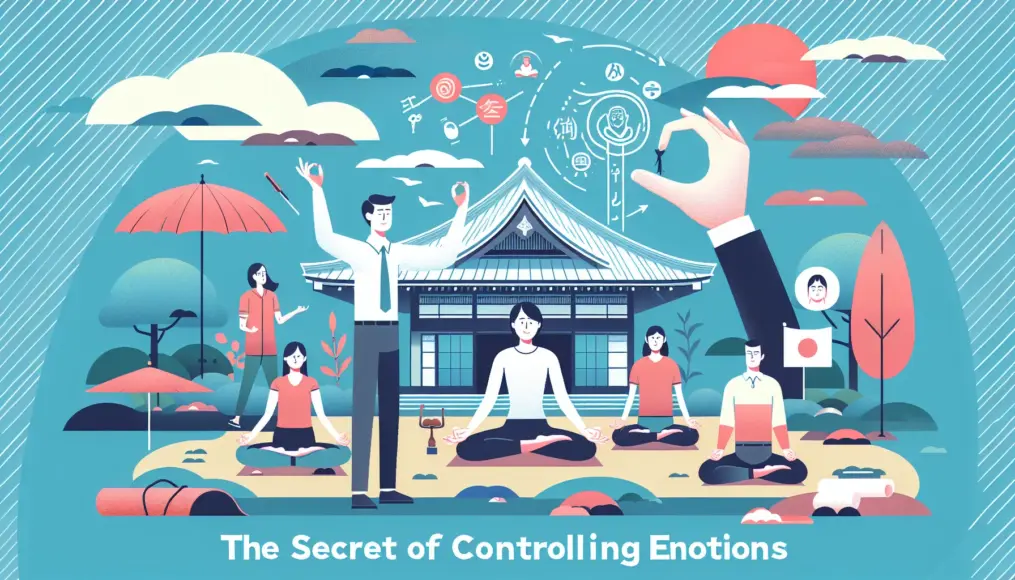Emotions play a significant role in our lives, yet they can sometimes feel overwhelming and hard to control. Imagine how much richer your everyday experiences could be if you could navigate your emotions with ease. In this blog, we’ll explore techniques and habits that can help you understand and manage your emotions more effectively. By gaining a deeper insight into your feelings, you can cultivate positive thinking and reduce stress in your daily life.
Managing emotions is also a powerful way to enhance self-awareness. When you recognize and appropriately control your feelings, you can foster better relationships with those around you. Let’s learn methods for maintaining inner peace and discover how to harness our emotions for our benefit.
So, let’s dive into some secret techniques for mastering emotional control together!
- Understanding the fundamentals of emotions deepens self-awareness.
- We’ll introduce methods for controlling emotions using breathing techniques and meditation.
- Learn the steps to make emotional management a daily habit.
The First Step to Understanding Emotions
To manage your emotions effectively, it’s crucial to first understand them. Emotions are deeply intertwined with our minds and bodies, significantly impacting our daily lives and relationships. By learning how emotions work and how they influence our thoughts and actions, we can improve our emotional management.
In this section, we will delve into the basics of emotions and explore their effects on our lives. Gaining insight into your emotions can enhance self-awareness and make it easier to control them.
Understanding the Basics of Emotions
Emotions refer to the diverse psychological responses that humans experience. Joy, sadness, anger, surprise, and fear are just a few examples of the myriad feelings that can arise within us. These emotions are closely linked to our physical responses and naturally manifest depending on the situation. By understanding your emotions, you can better gauge your own state of being.
Moreover, emotions are not merely reactions; they also influence our behaviors and choices. For instance, when we feel joy, we tend to engage in more proactive behaviors, while feelings of fear often lead us to seek escape. Knowing the fundamentals of emotions is the first step toward mastering them.
- Emotions are psychological responses with various types.
- Emotions are connected to physical reactions and affect our actions.
- Understanding your emotions is key to managing them effectively.
The Impact of Emotions on Daily Life
Emotions have a profound impact on our everyday lives. For example, heightened emotions at work or in relationships can lead to decreased judgment and concentration. Conversely, cultivating positive emotions can enhance creativity and communication skills.
Emotions also play a role in our health. Increased stress and anxiety can lead to physical ailments, while maintaining a calm emotional state can support overall well-being. Understanding how emotions affect daily life can provide valuable insights for leading a more fulfilling life.
- Emotions influence work and relationships.
- Positive emotions boost creativity and communication.
- It’s important to understand how emotions impact health.
Techniques for Managing Your Emotions
To effectively manage your emotions, it’s essential to learn specific techniques. Breathing exercises and meditation are widely recognized as effective methods for calming the mind. Additionally, incorporating positive thinking can help liberate you from negative feelings. In this section, we will explore concrete techniques for managing emotions and how to integrate them into your daily life.
By practicing these techniques, you can steer yourself in a better direction without being tossed around by emotional waves. Let’s learn ways to maintain mental stability and develop the ability to manipulate our emotions freely.
Breathing Exercises and Meditation
Breathing exercises and meditation are incredibly effective for controlling emotions. Deep breathing, in particular, can help lower your heart rate and create a relaxed state. Whenever you feel tension or anxiety creeping in, trying a few deep breaths can work wonders.
Meditation not only calms the mind but also helps you become more aware of your emotions. By incorporating just a few minutes of meditation into your daily routine, you can observe your inner self and understand the changes in your emotions. As a result, you’ll find it easier to control your feelings more consciously.
- Deep breathing has a calming effect on the mind
- Meditation enhances your ability to recognize your emotions
- Regular practice aids in emotional management
Embracing Positive Thinking
Positive thinking is crucial for managing your emotions. When you get caught up in negative feelings, your thoughts can spiral downward. However, adopting a positive perspective allows you to view situations in a more favorable light. It’s important to develop a habit of finding small positives in your daily life.
Additionally, speaking positive affirmations to yourself can be highly effective. Repeating phrases like “I can do this” or “I’m okay” boosts your confidence and helps keep your emotions upbeat. By shifting your thoughts, your emotions will naturally follow suit.
- Positive thinking reduces negative emotions
- It’s essential to cultivate the habit of spotting positives in everyday life
- Affirming yourself with positive words enhances your confidence
Incorporating Emotion Management Habits into Daily Life
Managing your emotions is a vital skill that can significantly improve your quality of life. By adopting certain habits into your daily routine, you can cultivate a natural approach to emotion management, leading to reduced stress and fewer negative feelings. In this section, we’ll explore practical steps to embed emotion management into your everyday life and provide techniques for practicing mindfulness. The goal is to help you understand your emotions and develop the ability to control them when necessary.
By integrating emotion management habits into your daily life, you’ll find it easier to maintain mental stability. Gradually working on this will empower you to navigate life without being overwhelmed by your emotions.
Steps to Build Emotion Management Habits
To make emotion management a habit, it’s essential to follow specific steps. By practicing a little each day, you can enhance your awareness of your emotions and alleviate stress. Start by finding a method that works best for you.
One effective step is to incorporate time for emotion management into your daily routine. For instance, consider setting aside a few moments in the morning after you wake up or right before bedtime to reflect on your emotions. Use this time to observe your feelings and contemplate how to manage them moving forward.
- Steps to establish emotion management as a habit are crucial.
- Begin by discovering what works for you.
- Allocating time in your daily routine makes it easier to practice.
Practicing Mindfulness
Mindfulness is a powerful tool for controlling emotions by focusing your awareness on the present moment. By recognizing and accepting your feelings and thoughts, you can minimize the impact of emotional turbulence. Engaging in mindfulness practices can lead to greater inner stability.
A simple yet effective way to practice mindfulness is to concentrate on your breathing. Find a quiet space, close your eyes, and take time to feel your breath; this can help calm your mind. Additionally, developing a habit of appreciating the little things in your daily life can also contribute to your mindfulness practice.
To deepen your understanding and implementation of emotion management, it’s important to learn from various perspectives. For further insights, check out this article on “Practical Methods and Techniques for Controlling Your Emotions” that details specific techniques for understanding and effectively managing your emotions. We encourage you to explore this resource to enhance your emotion management skills.
- Mindfulness is an effective tool for controlling emotions.
- Focusing on your breath can help calm your mind.
- Practicing gratitude in daily life is also part of mindfulness.
Strengthening Emotions Through Self-Evaluation and Understanding Your Strengths
To effectively manage your emotions, it’s crucial to improve your self-evaluation and to understand your strengths. When you have a high self-evaluation, you can gain confidence in yourself and become less affected by emotional ups and downs. Moreover, by understanding and leveraging your strengths, you can more easily evoke positive emotions. In this section, we’ll take a closer look at the importance of self-evaluation and how to utilize your strengths.
Self-evaluation and understanding your strengths form the foundation for strengthening your emotions. By knowing yourself better and utilizing your strengths, you can achieve better emotional management.
The Importance of Self-Evaluation
Self-evaluation is a key indicator of how you perceive yourself and it significantly impacts your emotions. A low self-evaluation can lead to a lack of confidence in your feelings and make you prone to negative thinking. Therefore, boosting your self-evaluation is the first step toward effective emotional management.
To enhance your self-evaluation, it’s important to reflect on and recognize your past successes and positive traits. Cultivating self-affirmation can help stabilize your emotions. By developing the habit of complimenting yourself in your daily life, you can gradually improve your self-evaluation.
- Self-evaluation has a significant impact on emotions
- Low self-evaluation can lead to negative thinking
- Reflecting on successes and cultivating self-affirmation is important
How to Leverage Your Strengths
Understanding and leveraging your strengths is highly effective in enhancing your emotions. By recognizing your strengths, you can control your emotions in ways that suit you best. For instance, someone who excels in creative thinking might express their emotions through art or writing.
To utilize your strengths, start by jotting down your skills and talents. From that list, focus on the things you particularly enjoy or feel passionate about, and try to incorporate them into your daily life. By leveraging your strengths, you’re likely to naturally evoke more positive emotions.
- Understanding and leveraging strengths enhances emotions
- Writing down your strengths can be effective
- Focusing on what you love can evoke positive emotions
Summary
Controlling our emotions is crucial for enriching our lives. By starting with an understanding of our emotions and utilizing various techniques like breathing exercises, meditation, and positive thinking, we can develop the ability to manage our feelings effectively. Additionally, enhancing our self-esteem and recognizing our strengths allows us to gain a better understanding of ourselves and fortify our emotional resilience.
It’s also important to incorporate emotional management habits into our daily routines. By taking small, consistent steps, we can maintain a calm mind and avoid being overwhelmed by our emotions. Let’s leverage this knowledge and these techniques to take control of our emotions and aim for a fulfilling life.
- Understanding and controlling emotions is essential
- Managing emotions can be achieved through breathing techniques and positive thinking
- Enhancing self-esteem and recognizing strengths can strengthen emotional health
Let’s integrate emotional management techniques into our daily lives to guide ourselves in a positive direction. We would love to hear your experiences and thoughts on emotional control in the comments!













































Comment